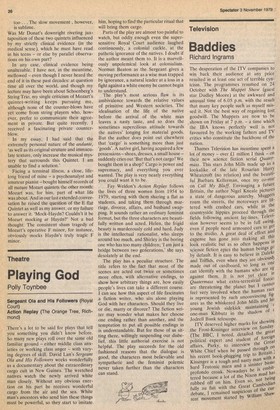Playing God
Polly Toynbee
Sergeant Ola and His Followers (Royal Court) Action Replay (The Orange Tree, Richmond) There's a lot to be said for plays that tell you something you didn't know before. So many new plays roll over the same old familiar ground — either middle class anxieties or working class anger — with varying degrees of skill. David Lan's Sergeant Ola and His Followers works wonderfully as a documentary about the extraordinary cargo cult in New Guinea. The wretched natives watch the newly arrived white man closely. Without any obvious exertion on his part he receives wonderful cargo from the air and the sea. White man's ancestors who send him these things must be powerful, so they start to imitate him, hoping to find the particular ritual that will bring them cargo.
Parts of the play are almost too painful to watch, but oddly enough even the super sensitive Royal Court audience laughed continuously, a colonial cackle, at the pathetic ignorance of the natives. I doubt if the author meant them to. It is. a marvell ously unpolemical look at colonialism. Norman Beaton as the Sergeant gives a moving performance as a wise man trapped by ignorance, a natural leader at a loss in a fight against a white enemy he cannot begin to understand.
The play's most serious flaw is its ambivalence towards the relative values of primitive and Western societies. The idealisation of the life of the native before the arrival of the white man leaves a nasty taste, and so does the sometimes supercilious attitude towards the natives' longing for material goods. But the author does point out elsewhere that 'cargo' is something more than just 'goods'. A native girl, having acquired a few possessions shoes, dresses, a small house — suddenly cries out 'But that's not cargo! We bought them in a shop!' Cargo is power and supremacy, and everything you ever wanted. The play is very nearly everything you could want it to be.
Fay Weldon's Action Replay follows the lives of three women from 1954 to 1979, starting with them sharing a flat as students, and taking them through marriage, divorce, affairs, and husband swapping. It sounds rather an ordinary feminist format, but the three characters are beautifully written and acted. Helen, the frigid beauty is murderously cold and hard. Judy is the intellectual rationalist, who sleeps around too much, and Shirley is the boring one who has too many children; 'I am just a bridge between two generations,' she says desolately at the end.
The play has a peculiar structure. The title refers to the fact that most of the scenes are acted out twice or sometimes more often, with alternative endings, to show how arbitrary things are, how easily people's lives can take a different course. I can see how this aspect of life fascinates a fiction writer, who sits alone playing God with her characters. Should they live or die, marry or divorce? The fiction writer may wonder what makes her choose one ending rather than another, and the temptation to put all possible endings in is understandable. But for those of us sitting there, willingly suspending our disbelief, this little authorial exercise is not helpful. The play succeeds for the old fashioned reasons that the dialogue is good, the characters most believable and sympathetic and the feminist polemic never taken further than the characters can stand.


































 Previous page
Previous page